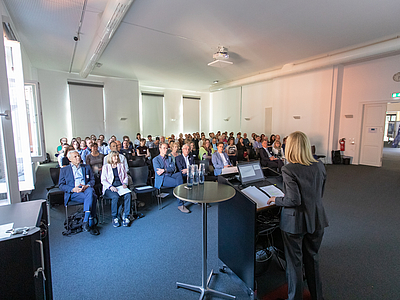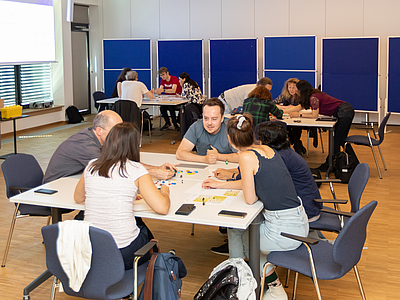Research data – The gold of our time

Research data – that sounds like dry subject matter, at best a playground for science nerds. But that couldn’t be further from the truth. Need an example? At the beginning of the pandemic in spring 2020, there was no research data on the effect of wearing masks. The result: politicians and health institutions meandered through the first months of the pandemic with contradictory opinions on wearing masks. For a broader public to better understand the importance of research data and how it’s handled, the U Bremen Research Alliance organised its first Research Data Day at the beginning of June – an excellent premiere.
The U Bremen Research Alliance (UBRA), an affiliation between the University of Bremen and 12 renowned non-university research institutions, invited guests to Bremer Haus Der Wissenschaft (House of Science) for the opening. "Research Data in the Era of Digitalisation" was the theme, with the approximately 100 guests taken on an impressive tour d'horizon. "With research data, we acquire our most valuable intangible assets," said University Rector Professor Jutta Günther. "We have to handle them and store them safely and carefully – just like gold, the gold of our time." A key instrument for this is the NFDI, the National Research Data Infrastructure, founded in October 2020, in which UBRA member institutions are heavily involved via nine research consortia.
Interoperability and governance are the central tasks, explained Dr Heide Ahrens, Secretary General of the Deutsche Forschungsgemeinschaft (DFG, German Research Foundation), for making research data not only socially but also economically usable. One impediment to this development is the current global political situation, due to which the G7 countries want restrictions on open access.
In his lecture on research data management as a basis for science-based policy decisions, Professor Hajo Zeeb from Bremen’s Leibniz Institute for Prevention and Epidemiology (BIPS) drew a nuanced conclusion from experiences during the pandemic. Much more than in the past, politicians have been seeking information and a dialogue with science. For example, the DFG-funded Competence Network Public Health, which worked on COVID-19 issues and in which BIPS is involved, has created almost 100 policy briefs. However, opportunities in important areas were not taken advantage of, like when linking vaccination data with health insurance data on the electronic health card.
Unfortunately, Germany is still lagging behind international developments on this front, in some areas like vaccination data even miles behind, concluded sociologist Professor Christof Wolf, President of GESIS - Leibniz Institute for the Social Sciences in Mannheim. More education, information and training are urgently needed so that the public and political decision-makers have more competence in assessing the reliability of data. This also applies to the hot topic of data privacy, where in Germany data privacy is often given exclusive priority over other legitimate needs such as health care.
It was a very informative, very stimulating evening. And for anyone who wanted to find out what real-life research data management looks like, the university and participating institutes followed up with Research Data Day offering workshops, lectures and walk-ins all around the Uni Bremen campus.
 © Jens Lehmkühler / U Bremen research Alliance
© Jens Lehmkühler / U Bremen research Alliance © Jens Lehmkühler / U Bremen research Alliance
© Jens Lehmkühler / U Bremen research Alliance © Jens Lehmkühler / U Bremen research Alliance
© Jens Lehmkühler / U Bremen research Alliance © Jens Lehmkühler / U Bremen research Alliance
© Jens Lehmkühler / U Bremen research Alliance © Jens Lehmkühler / U Bremen research Alliance
© Jens Lehmkühler / U Bremen research Alliance © Jens Lehmkühler / U Breen research Alliance
© Jens Lehmkühler / U Breen research Alliance

